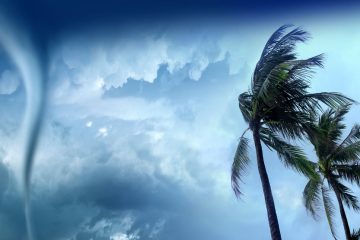Be Prepared for When the Worst Happens
Tsunamis, floods, earthquakes — even the most tranquil vacation spots can suffer the wrath of nature. In fact, holiday destinations such as tropical islands are prone to natural disasters. While traveling, you might find yourself in the middle of a large-scale natural event.
What should you do when the worst happens? Here are some essential tips for natural disaster survival for travelers.
Before You Go: How to Prepare for a Trip to a Natural Disaster Prone Area
Although you can’t control the likelihood of natural disasters, you can take a few simple steps to be prepared in case one does happen.
Be Informed
Before traveling to any destination, you should do some research on potential dangers. Although natural disasters like earthquakes can come out of the blue, hurricanes, cyclones and tsunamis typically occur during certain seasons. Make sure you research the weather of your destination and try to avoid periods when these events are most likely to occur.
Register Your Travel Plans with the Relevant Government Department
You’ll probably let your family and friends know where you’re going, but it’s a good idea to register with your government as well. In the United States, this is the State Department’s Smart Traveler Enrollment Program (STEP). In other countries, the foreign affairs department will typically offer an equivalent service.
By registering your travel details, your government will have your contact details and be able to provide assistance if an unforeseen crisis arises.
Stay Alert for Alerts
Before traveling, check the local news in your destination. It’s also wise to look up any security warnings or travel alerts for your destination with the travel or foreign affairs department in your home country.
Travel with a First Aid Kit
A kit with basic medical supplies should always be on your packing list. Items such as water purification tablets, spare batteries and a flashlight are also extremely useful in unexpected situations.
Download Relevant Apps
Before you set off, add a few apps to your collection. Weather Underground is a great option for keeping track of the weather. Hurricane Hound is even more specific, allowing you to track active hurricanes. First Aid by American Red Cross has potentially life-saving tips to help you survive all kinds of emergencies.
What to Do When a Natural Disaster Happens on Vacation
If a natural disaster strikes, staying safe is your first priority. As well as the risk of injuries during the disaster, natural events can also cause diseases to spread through poor sanitation, and disrupt public services and communication.
Getting caught up in this will be shocking, but staying calm and following some basic procedures will help get you through. Here’s what you should do:
- Although the exact response varies depending on the type of disaster, in nearly all situations the first thing you need to do is get off public streets and seek shelter.
- Follow any instructions given out by local authorities. This is especially important when you are in an unfamiliar country.
- Reach out to your embassy. This is a good place to seek advice and support, as well as to communicate with home if internet and mobile services are down.
- After the natural disaster has occurred, be aware of hazards. Fallen power lines or electrical sockets that have been exposed to water can be dangerous. Make sure you know it’s safe before venturing outside or using electronics.
- Be patient. You can expect chaos during a natural disaster, and things aren’t going to function the way they normally would. Help might not arrive as quickly as you expect. Remember that while your holiday may be ruined, local people may have lost their homes and livelihoods, so getting help to them is just as important as getting word to your family at home that you’re alright. Staying calm and reasonable no matter how frustrating the situation is vital.
Getting lost in a foreign city can be inspiring but also pretty stressful, so how can you avoid getting lost and what should you do if it happens?
Making Sure You’re Covered: Travel Insurance for Natural Disasters
Travel insurance is vital for any trip. In the case of a natural disaster, it can help ensure you get the help you need, seek medical attention without having to worry about the cost, or rearrange your trip.
Remember that every travel insurance plan varies according to the provider’s policies. The only way to know exactly what is and isn’t covered is to read through all the definitions carefully. While more coverage is always better, you can select your insurance based on the natural disasters that are most likely to occur in your holiday destination (for example, hurricanes).
Here are some important things to note about travel insurance for natural disasters:
- Travel insurance won’t cover KNOWN events. That means if a hurricane, snowstorm or other natural disaster has been forecasted at the time you purchase your insurance, you won’t be covered.
- Some travel insurance policies will exclude natural disasters such as volcanic eruptions or avalanches as “acts of God,” so be careful to take note of which events you will have coverage for.
- There are different levels of coverage for natural disasters — the more comprehensive (and expensive) your plan, the more you will be covered for. Trip interruption and cancellation, or missed connections and delays due to a natural disaster are commonly covered by even the most basic plans. Coverage for non-medical emergency evacuations may not be included in cheaper plans. Ideally, you should opt for travel insurance that covers trip interruptions, medical and dental care, and evacuations.
